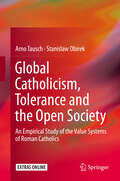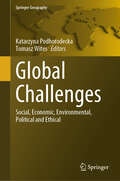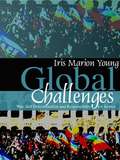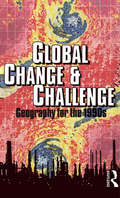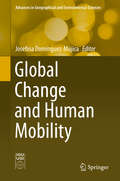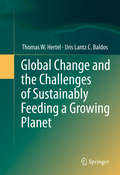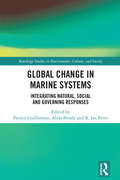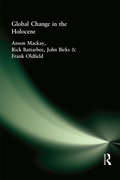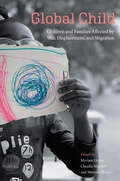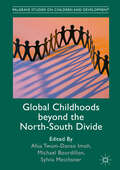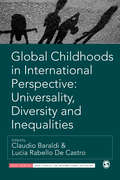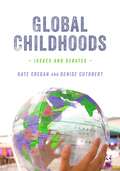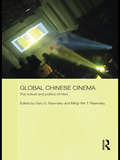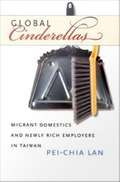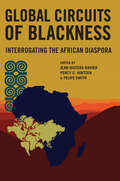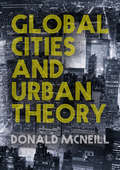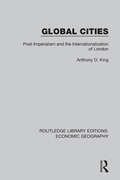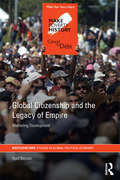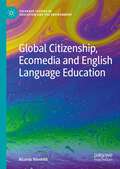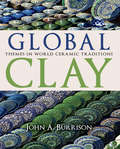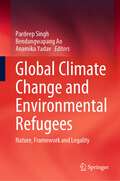- Table View
- List View
Global Catholicism, Tolerance and the Open Society: An Empirical Study of the Value Systems of Roman Catholics
by Arno Tausch Stanislaw ObirekThis book systematically assesses the political and social values of the more than 1.3 billion Catholics around the globe, by far the largest denomination of Western Christianity. Based on an extensive analysis of data from the World Values Survey and other global opinion surveys, the book sheds new light on the value systems and opinions of Roman Catholics. The authors highlight core problems and challenges the Church is currently facing in adapting to the modern world, including Catholic anti-Semitism, religious and sexual tolerance, and opinions towards democracy, while also offering an anthropological reflection on how well the Church is adapting or failing to adapt to the requirements of an open society.
Global Challenges: Social, Economic, Environmental, Political and Ethical (Springer Geography)
by Katarzyna Podhorodecka Tomasz WitesThis book addresses some of the most urgent global problems in today's world from a geographical perspective and highlights contemporary environmental, political, economic, social and geoethical aspects. The authors discuss causes, developments and challenges faced on a regional and global scale covering among others environmental issues such as loss of biodiversity, development of tourism, natural hazards and disaster risk reduction, migration issues, the global economic crisis and sustainable development. The presented collection of concepts and examples from specific regions offer a new outlook on globalization issues in the world as a whole. This volume can be used as a guide for students from different faculties who wish to understand global issues in the world from a geographical perspective. This book appeals to scientists and students of geography, economics, geopolitics, sustainability issues as well as policy makers and planners.
Global Challenges: War, Self-Determination And Responsibility For Justice
by Iris Marion YoungIn the late twentieth century many writers and activists envisioned new possibilities of transnational cooperation toward peace and global justice. In this book Iris Marion Young aims to revive such hopes by responding clearly to what are seen as the global challenges of the modern day. Inspired by claims of indigenous peoples, the book develops a concept of self-determination compatible with stronger institutions of global regulation. It theorizes new directions for thinking about federated relationships between peoples which assume that they need not be large or symmetrical. Young argues that the use of armed force to respond to oppression should be rare, genuinely multilateral, and follow a model of law enforcement more than war. She finds that neither cosmopolitan nor nationalist responses to questions of global justice are adequate and so offers a distinctive conception of responsibility, founded on participation in social structures, to describe the obligations that both individuals and organizations have in a world of global interdependence. Young applies clear analysis and cogent moral arguments to concrete cases, including the wars against Serbia and Iraq, the meaning of the US Patriot Act, the conflict in Palestine/Israel, and working conditions in sweat shops.
Global Change and Challenge: Geography for the 1990s
by Robert Bennett Robert EstallWe are now experiencing a period of unprecedented change; what amounts to a global revolution in our economy, society and awareness of the human impact on the environment. Global Change and Challenge examines some of the crucial issues facing society in the 1990s and how geography can contribute to their understanding and management. Using the broad theme of how societies adapt to change, the contributors seek to present a range of views on the `geography of change' in an accessible form for both school and university students. The general aim of the book is as much to encourage students to understand where we are and where we have some from, as to where we may be going. Robert Bennett and Robert Estall are both Professors of Geography at the London School of Economics. The contributors were all members of the Department of Geography at the LSE at the time of writing.
Global Change and Human Mobility
by Josefina Domínguez-MujicaThis book demonstrates the benefits of applying a new interdisciplinary approach that combines global change and human mobility. The term "globility" was coined in the year 2000 when the commission with the same name was created by the International Geographical Union with the purpose of theorizing about and asserting the concept of human mobility. First the book offers theoretical reviews of human mobility. Then it proceeds to study patterns of mobility in today's world as it faces new challenges in migration policies (including border controls, management of refugee movements, social initiatives to empower unauthorized immigrants), the integration issue, environmental hazards, and so on. The response to these diverse challenges reveals an increasing fluidity of human mobility and new forms of engagement of people on the move. Readers will obtain a better understanding of current human mobility from a large number of regions and from different thematic perspectives.
Global Change and the Challenges of Sustainably Feeding a Growing Planet
by Thomas W. Hertel Uris Lantz C. BaldosThis book explores the fundamental determinants of long term changes in agricultural land use and the associated implications for environmental and food security. The book is designed around the idea that each chapter focuses on one driver, or underlying determinant, of land use change at global scale. It starts with key factors which have been influential in the past, such as growth population, incomes and agricultural productivity, thereafter turning to new drivers such as biofuels, climate change and demand for environmental services. Specialized topics include food security outcomes, projections of future agricultural prices, greenhouse gas emissions, the role of globalization and market integration. The book draws heavily on the emerging body of literature on these topics, summarizes key findings and organizes these within a unifying economic framework.
Global Change in Marine Systems: Societal and Governing Responses (Routledge Studies in Environment, Culture, and Society)
by Patrice Guillotreau Alida Bundy R. Ian PerryMarine social and ecological systems around the world face multiple natural and anthropogenic stressors associated with global change. The resulting changes can create hardship for local societies that depend on them for food, livelihoods and wellbeing. Knowing how to respond to global change in a timely and appropriate manner is increasingly occupying the attention of researchers, policy makers, decision makers and practitioners around the world. Written by an international group of researchers from the natural and social sciences, Societal and governing responses to Global Change in Marine Systems analyses and appraises societal and governing responses to change, highlighting and explaining similarities and distinctions between successful, and less successful, responses. The authors present "I-ADApT", an analytical framework that enables decision makers to consider possible responses to global change, based on experiences elsewhere. Within this volume, I-ADApT is applied to 20 enlightening case studies covering a wide range of marine systems that have been challenged by critical global change issues around the world. Introducing innovative research to work towards a range of possible responses to global change, Societal and governing responses to Global Change in Marine Systems will appeal to undergraduate and postgraduate students, as well as postdoctoral researchers and practitioners interested in fields such as: Environment & Natural Resources, Marine Resources and social sciences.
Global Change in the Holocene (A\hodder Arnold Publication)
by John Birks Rick Battarbee Anson Mackay Frank OldfieldThe Holocene spans the 11,500 years since the end of the last Ice Age and has been a period of major global environmental change. However the rate of change has accelerated during the last hundred years, due largely to human impacts and this has led to a growing concern for the future of our environmental resources. Global Change in the Holocene demonstrates how reconstructing the record of past environmental change can provide us with essential knowledge about how our environment works and presents the reader with an informed viewpoint from which to project realistic future scenarios. The book brings together key techniques that are widely used in Holocene research, such as radiocarbon dating, dendrochronology and sediment analysis and offers a comprehensive analysis of various archives of environmental change including instrumental and documentary records, corals, lake sediments, glaciers and ice cores. This reference will be an informative and cutting-edge resource for all researchers in the fields of climate change, environmental science, geography, palaeoecology and archaeology.
Global Child: Children and Families Affected by War, Displacement, and Migration (Genocide, Political Violence, Human Rights)
by Andrew Jones Inka Weissbecker Leesa Hamilton Jaswant Guzder Churnjeet Mahn Michaelina Jakala April Mandrona Mateja Celestina Warren Linds Fatima Khan Karen Paul Nagui Demian Katie Mullins Sharon Bond Neil Bilotta Maya Fennig Alusine Bah Ines Marchand Ej Milne Mayra Guzman Farhio Ahmed Glynis Clacherty Thea Shahrokh Miranda D'Amico Meaghan ShevellArmed conflicts continue to wreak havoc on children and families around the world with profound effects. In 2017, 420 million children—nearly one in five—were living in conflict-affected areas, an increase in 30 million from the previous year. The recent surge in war-induced migration, referred to as a “global refugee crisis” has made migration a highly politicized issue, with refugee populations and host countries facing unique challenges. We know from research related to asylum seeking families that it is vital to think about children and families in relation to what it means to stay together, what it means for parents to be separated from their children, and the kinds of everyday tensions that emerge in living in dangerous, insecure, and precarious circumstances. In Global Child, the authors draw on what they have learned through their collaborative undertakings, and highlight the unique features of participatory, arts-based, and socio-ecological approaches to studying war-affected children and families, demonstrating the collective strength as well as the limitations and ethical implications of such research. Building on work across the Global South and the Global North, this book aims to deepen an understanding of their tri-pillared approach, and the potential of this methodology for contributing to improved practices in working with war-affected children and their families.
Global Childhoods beyond the North-South Divide (Palgrave Studies On Children And Development Ser.)
by Michael Bourdillon Afua Twum-Danso Imoh Sylvia MeichsnerThis book explores children’s lives across the Global North and Global South in the context of academic discussions of childhoods. The edited volume offers a unique selection of materials suitable for teaching in the areas of children, childhoods, young people, families, and education in a global context, as well as specific aspects of international development and social policy. While the focus of the project is conceptual rather than practical, the holistic understanding of childhoods that it encourages should also enable practitioners to better ensure that they are improving the lives of the children.
Global Childhoods in International Perspective: Universality, Diversity and Inequalities (SAGE Studies in International Sociology)
by Claudio Baraldi Lucia Rabello De CastroGlobal Childhoods in International Perspective gathers a wide spectrum of contributors from Europe, the U.S., South Asia, South Africa and Latin America, who, attuned with present dilemmas in the area of childhood studies, discuss some key theoretical and empirical aspects of child scholarship, such as identity, child wellbeing, child mobility and migration, intergenerational relationships and child abuse. Through these expert contributions, the book explores the many ways in which the relationship between universality and particularities of childhood plays an important role in describing global childhoods. The book highlights childhood as a cross-cutting issue in global sociology with chapters on globalization and schooling in Burkina Faso, child abuse and neglect in India, identity and integration among children of African immigrants in France, social class mobility of Filipino migrant children in Italy and France, and an investigation into Kyrgyz childhoods. Ideal reading for researchers, practitioners and students interested in both childhood studies and the other areas including community research, sociology of education, social stratification, and the sociology of migration.
Global Childhoods in International Perspective: Universality, Diversity and Inequalities (SAGE Studies in International Sociology)
by Claudio Baraldi Lucia Rabello De CastroGlobal Childhoods in International Perspective gathers a wide spectrum of contributors from Europe, the U.S., South Asia, South Africa and Latin America, who, attuned with present dilemmas in the area of childhood studies, discuss some key theoretical and empirical aspects of child scholarship, such as identity, child wellbeing, child mobility and migration, intergenerational relationships and child abuse. Through these expert contributions, the book explores the many ways in which the relationship between universality and particularities of childhood plays an important role in describing global childhoods. The book highlights childhood as a cross-cutting issue in global sociology with chapters on globalization and schooling in Burkina Faso, child abuse and neglect in India, identity and integration among children of African immigrants in France, social class mobility of Filipino migrant children in Italy and France, and an investigation into Kyrgyz childhoods. Ideal reading for researchers, practitioners and students interested in both childhood studies and the other areas including community research, sociology of education, social stratification, and the sociology of migration.
Global Childhoods: Issues and Debates
by Kate Cregan Denise Cuthbert"An exciting and engagingly written book. The case studies are intriguing and the discussion of previous theories impeccable." - Dr. Heather Montgomery, The Open University "What is a child? Kate Cregan and Denise Cuthbert begin this path-breaking and compelling work with a deceptively simple question. From this seemingly straightforward formulation, they unravel, interrogate and engage with some of the most pressing issues related to children in the early 21st century... This book is an absolute must for scholars in all the fields of childhood studies." - Professor Joy Damousi, University of Melbourne Global Childhoods draws on the authors’ interdisciplinary backgrounds and original research in the fields of embodiment, theorisations of childhood, children's policy, child placement and adoption, and family formation. The book critically demonstrates how following from the modern construction of childhood which emerged unevenly from the late eighteenth century, the twentieth century saw the emergence of the conception of the normative global child, a figure finally enshrined in the United Nations Convention on the Rights of the Child. The book offers a wide-ranging critical analysis of approaches to children and childhood across the social sciences. Through stimulating case studies which include the experiences of child soldiers, orphans, forced child migrants, and children and biomedicine, Cregan and Cuthbert critically test the notion of the ‘global child’ against the lived experiences of children around the globe. Kate Cregan and Denise Cuthbert draw on and contributes to debates on children and the idea of the child in a wide range of disciplines: sociology, anthropology, education, children's studies, cultural studies, history, psychology, law and development studies. In its historical coverage of the rise of the concepts of the child and the global child, its critical engagement with the theorisation of childhood, and its detailed case studies, the book is essential reading for the study of children and childhood.
Global Childhoods: Issues and Debates
by Kate Cregan Denise Cuthbert"An exciting and engagingly written book. The case studies are intriguing and the discussion of previous theories impeccable." - Dr. Heather Montgomery, The Open University "What is a child? Kate Cregan and Denise Cuthbert begin this path-breaking and compelling work with a deceptively simple question. From this seemingly straightforward formulation, they unravel, interrogate and engage with some of the most pressing issues related to children in the early 21st century... This book is an absolute must for scholars in all the fields of childhood studies." - Professor Joy Damousi, University of Melbourne Global Childhoods draws on the authors' interdisciplinary backgrounds and original research in the fields of embodiment, theorisations of childhood, children's policy, child placement and adoption, and family formation. The book critically demonstrates how following from the modern construction of childhood which emerged unevenly from the late eighteenth century, the twentieth century saw the emergence of the conception of the normative global child, a figure finally enshrined in the United Nations Convention on the Rights of the Child. The book offers a wide-ranging critical analysis of approaches to children and childhood across the social sciences. Through stimulating case studies which include the experiences of child soldiers, orphans, forced child migrants, and children and biomedicine, Cregan and Cuthbert critically test the notion of the 'global child' against the lived experiences of children around the globe. Kate Cregan and Denise Cuthbert draw on and contributes to debates on children and the idea of the child in a wide range of disciplines: sociology, anthropology, education, children's studies, cultural studies, history, psychology, law and development studies. In its historical coverage of the rise of the concepts of the child and the global child, its critical engagement with the theorisation of childhood, and its detailed case studies, the book is essential reading for the study of children and childhood.
Global Chinese Cinema: The Culture and Politics of 'Hero' (Media, Culture and Social Change in Asia)
by Gary D. RawnsleyThe film Hero, directed by Zhang Yimou and released in 2002, is widely regarded as the first globally successful indigenous Chinese blockbuster. A big expensive film with multiple stars, spectacular scenery, and astonishing action sequences, it touched on key questions of Chinese culture, nation and politics, and was both a domestic sensation and an international hit. This book explores the reasons for the film’s popularity with its audiences, discussing the factors which so resonated with those who watched the film. It examines questions such as Chinese national unity, the search for cultural identity and role models from China’s illustrious pre-communist past, and the portrayal of political and aesthetic values, and attitudes to gender, sex, love, and violence which are relatively new to China. The book demonstrates how the film, and China’s growing film industry more generally, have in fact very strong international connections, with Western as well as Chinese financing, stars recruited from the East Asian region more widely, and extensive interactions between Hollywood and Asian artists and technicians. Overall, the book provides fascinating insights into recent developments in Chinese society, popular culture and cultural production.
Global Cinderellas: Migrant Domestics and Newly Rich Employers in Taiwan
by Pei-Chia LanMigrant women are the primary source of paid domestic labor around the world. Since the 1980s, the newly prosperous countries of East Asia have recruited foreign household workers at a rapidly increasing rate. Many come from the Philippines and Indonesia. Pei-Chia Lan interviewed and spent time with dozens of Filipina and Indonesian domestics working in and around Taipei as well as many of their Taiwanese employers. On the basis of the vivid ethnographic detail she collected, Lan provides a nuanced look at how boundaries between worker and employer are maintained and negotiated in private households. She also sheds light on the fate of the workers, "global Cinderellas" who seek an escape from poverty at home only to find themselves treated as disposable labor abroad. Lan demonstrates how economic disparities, immigration policies, race, ethnicity, and gender intersect in the relationship between the migrant workers and their Taiwanese employers. The employers are eager to flex their recently acquired financial muscle; many are first-generation career women as well as first-generation employers. The domestics are recruited from abroad as contract and "guest" workers; restrictive immigration policies prohibit them from seeking permanent residence or transferring from one employer to another. They care for Taiwanese families' children, often having left their own behind. Throughout Global Cinderellas, Lan pays particular attention to how the women she studied identify themselves in relation to "others"--whether they be of different classes, nationalities, ethnicities, or education levels. In so doing, she offers a framework for thinking about how migrant workers and their employers understand themselves in the midst of dynamic transnational labor flows.
Global Circuits of Blackness: Interrogating the African Diaspora
by Stéphane Robolin Marlon M. Bailey Jean Muteba Rahier Felipe Smith Jung Ran Forte Reena N Goldthree Percy C. Hintzen Lyndon Phillip Andrea QueeleyGlobal Circuits of Blackness is a sophisticated analysis of the interlocking diasporic connections between Africa, Europe, the Caribbean, and the Americas. A diverse and gifted group of scholars delve into the contradictions of diasporic identity by examining at close range the encounters of different forms of blackness converging on the global scene. Contributors examine the many ways blacks have been misrecognized in a variety of contexts. They also explore how, as a direct result of transnational networking and processes of friction, blacks have deployed diasporic consciousness to interpellate forms of white supremacy that have naturalized black inferiority, inhumanity, and abjection. Various essays document the antagonism between African Americans and Africans regarding heritage tourism in West Africa, discuss the interaction between different forms of blackness in Toronto's Caribana Festival, probe the impact of the Civil Rights movement in America on diasporic communities elsewhere, and assess the anxiety about HIV and AIDS within black communities. The volume demonstrates that diaspora is a floating revelation of black consciousness that brings together, in a single space, dimensions of difference in forms and content of representations, practices, and meanings of blackness. Diaspora imposes considerable flexibility in what would otherwise be place-bound fixities. Contributors are Marlon M. Bailey, Jung Ran Forte, Reena N. Goldthree, Percy C. Hintzen, Lyndon Phillip, Andrea Queeley, Jean Muteba Rahier, Stéphane Robolin, and Felipe Smith.
Global Cities and Urban Theory
by Donald McNeillGlobal Cities and Urban Theory provides an innovative set of approaches to understanding some of the world's major cities, working with concepts such as smart cities, volumetric urbanism, and critical accounting to illustrate the everyday agents and practices that place cities in the world. Donald McNeill draws on detailed discussions of major cities such as London, San Francisco, Paris and Singapore to provide a deep understanding of how urban theory can be grounded in the cultural economies of urban development. The book: Reviews the insights of key thinkers such as Bruno Latour, Mike Davis, and Jane M. Jacobs in relation to specific cities. Highlights methodological and epistemological notes on each theme. Provides case studies of nine key global cities, examined in the context of specific material and spatial practices. Essential reading for upper level students and researchers across urban studies, urban geography, urban sociology and urban policy.
Global Cities and Urban Theory
by Donald McNeillGlobal Cities and Urban Theory provides an innovative set of approaches to understanding some of the world′s major cities, working with concepts such as smart cities, volumetric urbanism, and critical accounting to illustrate the everyday agents and practices that place cities in the world. Donald McNeill draws on detailed discussions of major cities such as London, San Francisco, Paris and Singapore to provide a deep understanding of how urban theory can be grounded in the cultural economies of urban development. The book: Reviews the insights of key thinkers such as Bruno Latour, Mike Davis, and Jane M. Jacobs in relation to specific cities. Highlights methodological and epistemological notes on each theme. Provides case studies of nine key global cities, examined in the context of specific material and spatial practices. Essential reading for upper level students and researchers across urban studies, urban geography, urban sociology and urban policy.
Global Cities: Post-imperialism And The Internationalization Of London (Routledge Library Editions: Economic Geography)
by Anthony D KingSince the late 1970s the role of key world cities such as Los Angeles, New York and London as centres of global control and co-ordination has come under increasing scrutiny. This book provides an overview and critique of work on the global context of metropolitan growth, world city formation and the theory it has generated. Suggesting ‘post-imperialism’ as the most appropriate framework for analysis, the author demonstrates the extent to which urban and regional development, both in Britain and elsewhere, were linked to a colonial mode of production, and highlights the effects of its disappearance. Against this background, the author charts the transformation of London from imperial capital in the nineteenth and early twentieth centuries to world city in the capitalist world economy of today.
Global Citizenship and the Legacy of Empire: Marketing Development (RIPE Series in Global Political Economy)
by April BiccumThis book investigates the parallels between mainstream development discourse and colonial discourse as theorized in the work of Homi Bhabha, Gayatri Spivak and Edward Said. Aiming to repoliticize post-colonial theory by applying its understandings to contemporary political discourses, author April Biccum critically examines the ways in which development in its current form has recently begun to be promoted among the metropolitan public. Biccum contends that what has begun is a sustained marketing campaign for development that is a repetition, augmentation and ultimately much greater success of the work of the Empire Marketing Board of 1926. Demonstrating how this marketing campaign for development attempts to facilitate support for neo-liberal globalization, Biccum contends that this theatre of legitimation is emerging in response to growing critical voices and counter-hegemonic activity on the international stage. Featuring in depth analyses of the UK, cultural values, DfID, the commemoration of the slave trade and campaigns including Live8 and Make Poverty History, this book will be of interest to students and scholars of postcolonial studies, development studies, and international political economy. It will also offer insights valuable to a wider range of subjects including critical theory and globalization studies.
Global Citizenship, Ecomedia and English Language Education (Palgrave Studies in Education and the Environment)
by Ricardo RömhildThis book presents a unique framework for the inclusion of ecomedia in the English language classroom to help learners cultivate global citizenship. Foregrounding learner agency in a world at risk, the author proposes a framework that hinges on human rights and critical eco-cosmopolitanism to help learners position themselves in discourses on climate change and act for transformation. The book discusses eco-documentaries as multimodal, factional texts against the background of cutting-edge research, refuting a definition based on the binary of fiction and non-fiction. Translating the insights gained from this discussion to the language education context, learners are conceptualised as active designers of meaning making when engaged with eco-documentaries. Based on this discussion, the book puts forth an innovative, multiliteracies-informed concept which is embedded in a sustainability-oriented pedagogy of hope, which encourages learners to learn and practice languages of hope and advocacy. The book will be of interest to scholars in the fields of ecopedagogy, sustainability education, global citizenship education and cultural learning, film pedagogy and language education, as well as language educators.
Global Clay: Themes in World Ceramic Traditions
by John A. BurrisonFor over 25,000 years, humans across the globe have shaped, decorated, and fired clay. Despite great differences in location and time, universal themes appear in the world’s ceramic traditions, including religious influences, human and animal representations, and mortuary pottery. In Global Clay: Themes in World Ceramic Traditions, noted pottery scholar John A. Burrison explores the recurring artistic themes that tie humanity together, explaining how and why those themes appear again and again in worldwide ceramic traditions. The book is richly illustrated with over 200 full-color, cross-cultural illustrations of ceramics from prehistory to the present. Providing an introduction to different styles of folk pottery, extensive suggestions for further reading, and reflections on the future of traditional pottery around the world, Global Clay is sure to become a classic for all who love art and pottery and all who are intrigued by the human commonalities revealed through art.
Global Clay: Themes in World Ceramic Traditions
by John A. BurrisonFor over 25,000 years, humans across the globe have shaped, decorated, and fired clay. Despite great differences in location and time, universal themes appear in the world's ceramic traditions, including religious influences, human and animal representations, and mortuary pottery. In Global Clay: Themes in World Ceramic Traditions, noted pottery scholar John A. Burrison explores the recurring artistic themes that tie humanity together, explaining how and why those themes appear again and again in worldwide ceramic traditions. The book is richly illustrated with over 200 full-color, cross-cultural illustrations of ceramics from prehistory to the present. Providing an introduction to different styles of folk pottery, extensive suggestions for further reading, and reflections on the future of traditional pottery around the world, Global Clay is sure to become a classic for all who love art and pottery and all who are intrigued by the human commonalities revealed through art.
Global Climate Change and Environmental Refugees: Nature, Framework and Legality
by Pardeep Singh Anamika Yadav Bendangwapang AoThis book explores the possibilities of understanding the concept of climate refugees in order to ascribe to a consensual agreement that climate refugees are evident and this situation is a reality.A framework to study both empirically and theoretically is presented in a detailed manner so that it may become a resource for understanding the challenges of climate refugees.Through discussion and analysis the book presents potential answers to such questions as:● Why has the international system been so short-sighted and has not given importance to the problems of climate migrants and refugees?● How to identify a climate refugee?● How do you justify a climate refugee or a migrant?● What are internally displaced people? Should we call them just refugees?The book covers the interdisciplinary nature of climate refugees and the perspectives of social science. The empirical findings provides an edge to holistically understanding climate refugees.This book discusses the concept of, what really is a climate refugee, and the necessary factors to make it an important part of the climate discourse. The legality of the term is missing in international parlance, and the academic discourse should provide the necessary critique required for the evolution of the subject under study. Therefore, the major objective of the book is to make the subject of climate migration known to all.
